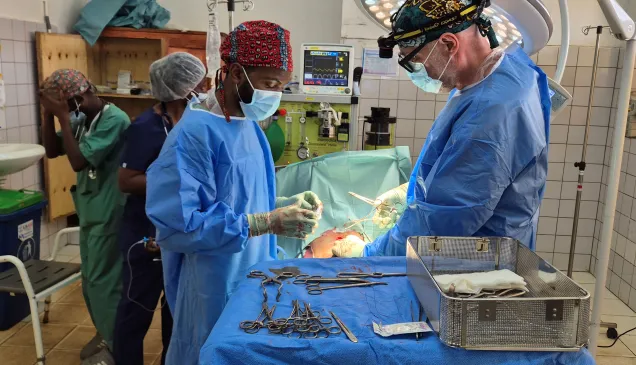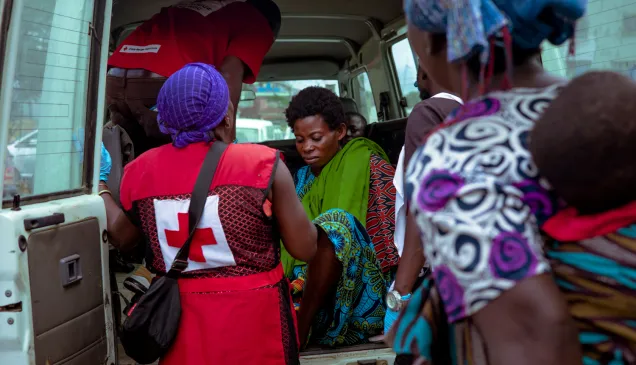The Global Network for Weapon-Wounded Care and Surgical Learning Hub
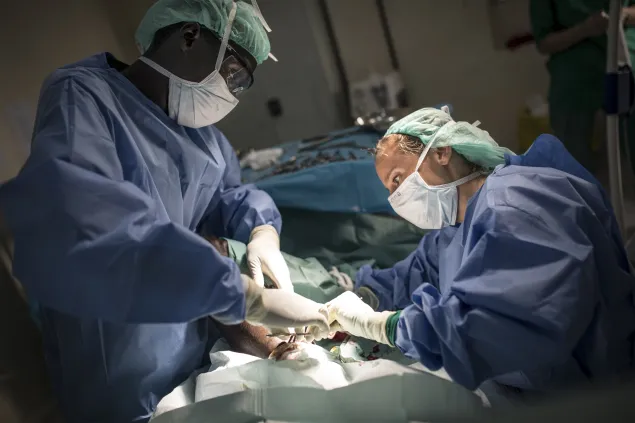
NEWS, EVENTS, AND UPCOMING TRAININGS
The Surgical Learning Hub (SLH) and The Global Network for Weapon-Wounded Care will be showcased at the Humanitarian Village of International Conference of the Red Cross and Red Crescent from October 28 to 31, 2024.
The 1st ICRC Conference on Weapon-Wounded Care aims to promote and strengthen the continuum of care in conflicts and will take place at the CICG in Geneva on the 17th and 18th December. The event will launch The Global Network for Weapon-Wounded Care.
A training for Surgical Teams in War occurred in Bukavu, DRC between the 14-16th May 2024. 16 participants took part from the Movement and local partners. 2025 trainings in the SLH in Bukavu will be announced in the new year.
VISION
The Surgical Learning Hub (SLH) and the Global Network for Weapon-Wounded Care aim to reduce morbidity and mortality rates among weapon-wounded patients by improving the quality of hospital and surgical care provided in conflict settings and other situations of violence. To this end, a training centre has been established in Bukavu, Democratic Republic of the Congo (DRC), and a global network of partners is being developed.
The SLH is embedded in local health and education institutions and serves as a physical space for delivering continuing medical education (CME) for surgical teams. Concurrently, the Global Network for Weapon-Wounded Care brings together stakeholders from the International Red Cross and Red Crescent Movement, academia, the development sector, non-governmental organizations and humanitarian aid agencies involved in providing hospital and surgical care. This collaborative effort aims to ensure knowledge and expertise are shared from the global level to the local level and vice versa. The ambition is to develop further surgical learning hubs that connect with the Global Network for Weapon-Wounded Care, thus creating a global partnership that best serves the needs of those wounded as a result of armed conflict or other violence.
PURPOSE
In the past, the delivery of surgical and hospital care in areas in which the ICRC operates is increasingly hampered by a scarcity of proficient and well-trained health professionals able to provide quality services in challenging settings with limited resources. In response to this situation, in December 2019, the ICRC Assembly approved the Hospital Surgical Capacity-Building Project (HSCB). This takes a phased approach, with the ICRC progressively building its hospital and surgical capacities and those of Partner National Societies, local institutions and global partners. From this, the Surgical Learning Hub and the Global Network for Weapon-Wounded Care emerged as crucial initiatives to address and fulfil the project’s mandate.
PARTNERSHIPS
Currently we have a Surgical Learning Hub located in Bukavu, DRC, where it benefits from the long-standing partnerships between the ICRC and the Provincial General Reference Hospital Bukavu (HPGRB), as well as the University of Bukavu (UCB). These partnerships ensure that training is both locally tailored and delivered by front-line workers experienced in conflict and emergency situations. The Global Network coordinates and aligns training curricula, accreditation and learning pathways, contributing to the global exchange of knowledge while maintaining local relevance. The proximity of the SLH to ongoing ICRC field projects means trainees can benefit from practical, real-world learning experience.

Convened and coordinated by the ICRC, the Global Network for Weapon-Wounded Care aims to support the Surgical Learning Hub in Bukavu and further hubs in a shared mission of ensuring the delivery of world-leading care and treatment in conflict setting
SUSTAINABILITY
Over time, it is planned that the SLH will become operationally and financially sustainable with only limited or no ICRC involvement. The funding model is based on training fees, with those paid by international participants supporting local staff, supplemented by modest rental fees. Together, these cover the hub’s costs, allowing it to break even in the long term. The ICRC analysed the demand for training within the International Red Cross and Red Crescent Movement and among international partners to determine the revenue model. It also confirmed operational costs with the ICRC's subdelegation in Bukavu and local partners. The model builds on a development phase running in Bukavu since January 2023.
The Global Network for Weapon-Wounded Care will ensure the success of the SLH by helping to disseminate lessons learned and best practices from the hub, and by recruiting participants and additional global expertise for SLH trainings.
IMPACT
The humanitarian impact of the SLH and the Global Network is twofold:
- Local impact: the SLH strengthens local and regional health-care systems by improving the quality of hospital and surgical care. It provides specialized training for local surgeons, anaesthetists and nurses, alongside Movement and international response teams, enhancing local and international capacities to respond to clinical needs in conflict-affected areas.
- Global impact: the Global Network supports the capacity of the ICRC, Movement and other humanitarian actors to provide life-saving health services in situations of armed conflict. It facilitates joint training programmes, including those delivered at Surgical Learning Hubs, knowledge exchange and collaboration, helping surgical and clinical teams to provide weapon-wounded care in conflict zones worldwide.
The Network leverages on partnerships to enhance and ensure sustainable outcomes at both local and global level.
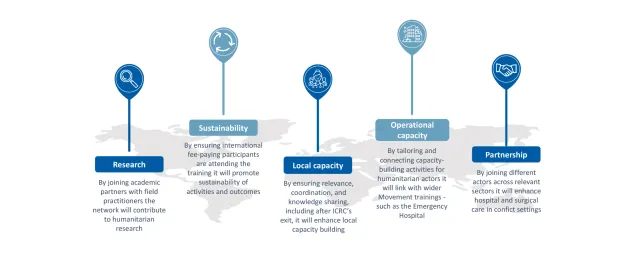
PARTNERSHIP BENEFITS
Partners who join the Global Network have the opportunity to:
- support the ICRC’s humanitarian mission to reduce mortality and morbidity in armed conflict and other situations of violence, and protect people affected by conflict.
- learn from the ICRC’s experienced mobile surgical teams about providing weapon-wounded care in complex environments.
- collaborate and innovate with other organizations providing weapon-wounded care.
- strengthen surgical and clinical response teams through training delivered via the Global Network, including by the Surgical Learning Hub.
PUBLICATIONS
Introducing the ICRC Surgical Learning Hub: Surgical Learning Hubs concept and implementation is one of the key deliverables of the Hospital Surgical Capacity Building Project. The poster explains how setting up the Surgical Learning Hub is crystalizing all the innovative ingredients to effectively build capacity in war surgery, ensuring a sustainable impact through local partnerships.
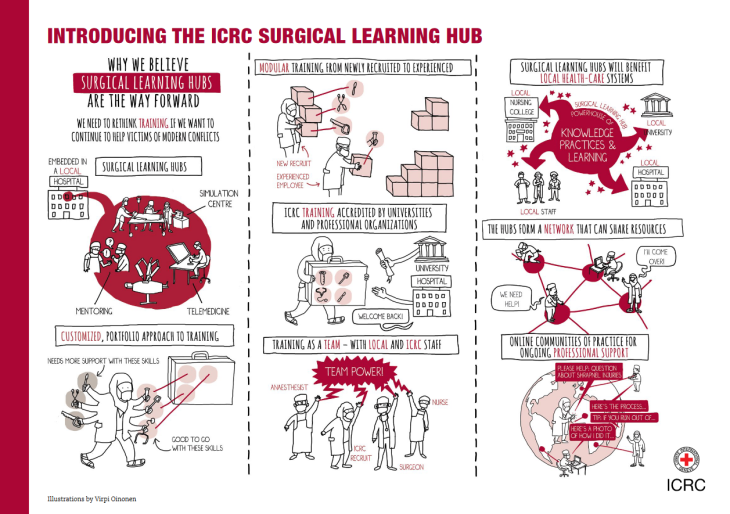
Hospital Services Capacity-Building Framework: Building Capacity Today, for the Health Outcomes of Tomorrow: This framework aims to provide a comprehensive approach to building the capacity of hospital and surgical staff. It expands beyond the definition of capacity building as training to include three levels: individual, organization, and system. Ultimately, it strives to standardize capacity-building practices across hospital projects to ensure sustainable health outcomes for the communities ICRC serves.

OUR PARTNERS

CONTACT US
Email us at weaponwoundedcare@icrc.org for more information.

